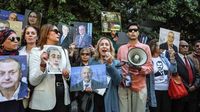On Saturday, April 19, 2025, a court in Tunisia sentenced approximately 40 defendants, including notable opposition figures, to prison terms ranging from 13 to 66 years for charges of plotting against state security and belonging to a terrorist group. This unprecedented trial, described by many as a mega-trial, has drawn significant attention both locally and internationally, highlighting the ongoing political tensions in Tunisia following President Kaïs Saïed's consolidation of power.
The defendants, who include party leaders, political activists, lawyers, and business people, were found guilty of various degrees of conspiracy against the state. Some of these individuals have been incarcerated since their arrest two years ago, while others remain free or are currently in exile. The verdicts were announced after a trial that began on March 4, 2025, and has been marked by controversy and claims of judicial impropriety.
During the third hearing of the trial on April 18, defense lawyers expressed outrage when the judge concluded the reading of the indictment and moved to deliberation without allowing for a defense plea or any requests from the lawyers. Samia Abbou, a prominent defense attorney, criticized the proceedings as "a masquerade," pointing out that the defendants were not given a chance to be heard. "The power wants a verdict today," she stated, emphasizing what she described as a blatant violation of judicial procedures.
Among the high-profile defendants are Issam Chebbi, the leader of the Al Joumhouri party; Jawhar Ben Mbarek, a co-founder of the main opposition coalition, the Front de Salut National (FSN); and Abdelhamid Jelassi, a former leader of the Islamist party Ennahdha. The trial has seen at least six defendants go on hunger strike to protest their treatment and demand their right to appear in court.
Human Rights Watch has condemned the trial, asserting that it is taking place in a "repressive context" where President Saïed is allegedly using the judicial system to target political opponents and dissenters. This sentiment echoes broader concerns regarding the state of freedoms in Tunisia, a country that was once celebrated for its democratic aspirations during the Arab Spring in 2011.
Since Saïed's power grab in the summer of 2021, critics have noted a significant decline in civil liberties. The president has been accused of consolidating power in ways that undermine democratic institutions. Since the spring of 2023, dozens of political officials, lawyers, rights activists, and journalists have been arrested under a controversial decree aimed at suppressing the dissemination of false news. This legislative move has been widely criticized for its vague language, which many believe allows for arbitrary interpretation and enforcement.
The latest court ruling has sent shockwaves through Tunisia, where many view it as part of a broader strategy to silence dissent and eliminate political opposition. Kamel Jendoubi, one of the defendants currently living abroad, condemned the verdict as a "judicial assassination," asserting that the legal proceedings are politically motivated rather than grounded in justice.
Haifa Chebbi, the daughter of Ahmed Nejib Chebbi, one of the defendants who was allowed to remain free, expressed her dismay at the ruling, stating, "It is a verdict prepared in advance, without surprise." She lamented the state of justice and liberties in Tunisia, reflecting the sentiments of many who fear for the future of democratic governance in the country.
This trial, with its significant number of defendants and severe charges, represents a critical moment in Tunisia's political landscape. Observers are closely monitoring the implications of these sentences on the country's already fragile democracy. The international community, including various human rights organizations, has called for the protection of political freedoms and an end to the repression of dissenting voices.
As the situation develops, many Tunisians are left to grapple with the reality of a judicial system that they believe is increasingly being used as a tool for political repression. The outcome of this mega-trial may set a precedent for future governance in Tunisia, raising questions about the resilience of its democratic institutions and the rights of its citizens.
In the wake of these events, the call for justice and accountability continues to resonate among the opposition and civil society groups. The hope remains that Tunisia can navigate through this challenging period and uphold the democratic ideals that inspired the Arab Spring over a decade ago.




